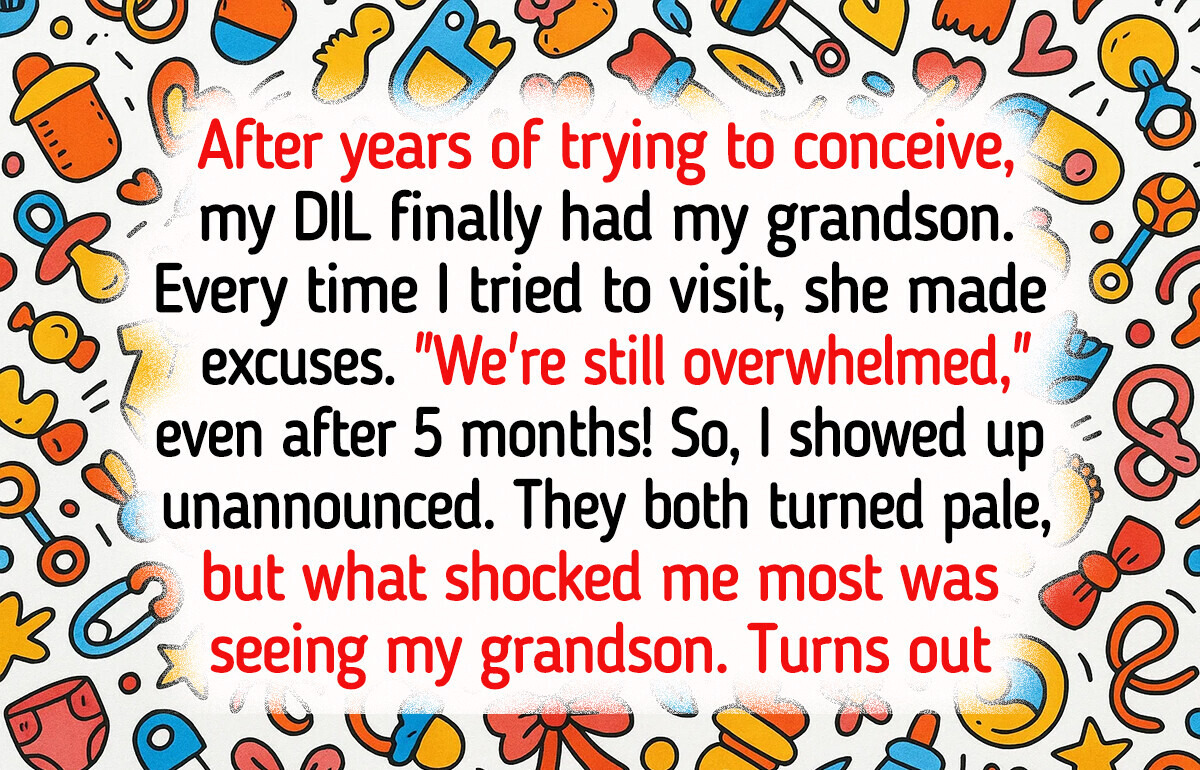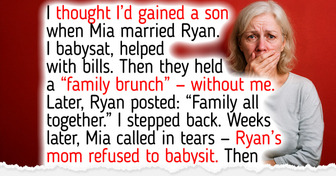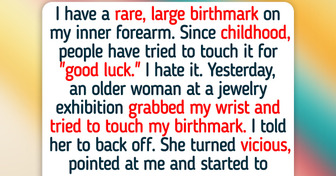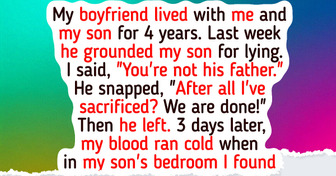You can go to hell, and WHAT BETRAYAL? If YOUR SON made the choice to raise the child as his own, why should you have any objections. Would you do the same thing if the child was ADOPTED? Also, if they have been "trying for years" how did she get pregnant in the "early days of the marriage" unless they were trying before they got married? Either way it's very clear why they didn't want you around because they KNEW how shamefully you would behave. You are a JUDGEMENTAL, SELFISH woman and the child doesn't need that in his life. Your son's decision is his, just as your decision is yours. Your son is NOT A WIMP, he is a loving man who CHOSE to raise this child. Maybe he wants to make sure that "his son" isn't raised with the prejudice he was possibly raised with. It is sad that she cheated on him, however, If he has FORGIVEN his wife, THAT IS NONE OF YOUR BUSINESS! Now you will miss out on having a grandchild that would bring love and joy into your life. People who get hung up on being "BLOOD RELATED" always miss out on giving and receiving love.
My DIL Banned Me From Seeing My Grandson for 5 Months — the Reason Was Painful

Juliet opened up about her experience
Dear Bright Side,
I do hope this letter finds you well. It has been quite a trying time for me, and I feel I must share my sorrowful tale. You see, my very first grandson was born six months ago, and yet, my daughter-in-law refuses to allow me the pleasure of meeting him. She tells me, “I’m just not ready for visitors,” which is, to my mind, an odd excuse. I have not even seen a photograph, though her own mother has moved in to assist her with the child.
Yesterday evening, I could bear it no longer, and so I decided to visit my son’s house, uninvited, you might say. Well, imagine my surprise when I saw their faces turn as pale as ghosts.
I was simply struck dumb when I saw that my grandson was dark-skinned, which was most perplexing, considering my son and daughter-in-law are both very fair.
My son, dear boy, took my hand and explained with much sadness that it had been a great shock to them as well. It seems, in the early days of their marriage, my daughter-in-law had a brief indiscretion. They never dreamed that the child would not be my son’s, though once the baby was born, he made the choice to raise him as his own.
They kept me at arm’s length because they feared how I might react to this revelation. I was utterly crushed, hurt beyond words by this betrayal, and devastated to learn that the child I had thought was my flesh and blood was, in fact, no relation to me.
I told my son, quite firmly, that he was no longer my son, just as this child was not his. I then informed my daughter-in-law that she was no longer welcome in my home, just as I was not welcome in her child’s life. I made it clear that neither this child nor any future ones should expect anything from me. And with that, I left.
Now, my heart is heavy, and I am uncertain where to go from here.
Yours truly,
Juliet
Juliet, what you’re going through sounds incredibly difficult, full of unexpected twists and deep emotional hurt. Here are four practical suggestions to guide you as you consider your next move.
Write a letter to understand, not to accuse
Give yourself the opportunity to write a sincere letter to your son and daughter-in-law, not as an accusation, but as a way to work through your own emotions. Share with them how deeply hurt you felt by being excluded, how overwhelming the truth was, and why your reaction was so intense. Even if you don’t send it, this exercise can offer you a chance to release your emotions in a controlled way, rather than letting them build up and resurface later.
Seek to understand your son’s perspective, even if you’re not ready to endorse it

Congratulations to your son and his wife . They knew that you would be self righteous and petty . The child deserves to be loved and not be around negatively
Your son remains the person you raised, and he has decided to care for a child who isn’t biologically his. While this doesn’t undo the sense of betrayal, it reflects his character and his ability to love.
If you ever wish to rebuild your bond, this might be the way in, recognizing the child not as yours, but as the one your son has chosen to call his own.
Define your space without damaging relationships

What a female canine the lw sounds like. I am sure son is happy such hateful person is not around his family.
You don’t need to agree to everything or rush into a role you’re not prepared for. Instead of completely distancing yourself, try expressing something like, “I need some time. I’m not ready to be involved right now, but I’ll reach out when I am.”
This allows you to process your feelings without shutting the door entirely.
Talk to someone with no personal stake

It seems your columnist get nothing. If they knew the child was not his, her son should have talked to her then. They danced this woman around for five months, when they could simply told her the truth. For people who cry racism, tell me what a black family would do if their long awaited grandchild was white. Same deal. Did they think she would wait 18 years to see the kid? Her son should have told her. If she acted badly, they could go LC or NC. Everybody in town saw this. How embarrassing. It is so thoughtless and demeaning not to be honest. They will still not get that it is their behavior more than the color of that child's skin. Sad.
Talking to someone outside your family, like a therapist, can help you sort through the tangled emotions of deception, uncertainty, sorrow, or even guilt. While this situation isn’t your fault, the emotional burden is yours to carry. A neutral party can offer guidance on how to manage it, or let it go entirely.
If you’re navigating challenging family relationships, you’re not alone. For more on how one mother took a stand to protect her family from overstepping in-laws, take a look at this story.
Comments
Cut them loose,the son is an idiot..
Everyone has a right to do what they feel is right and I feel she is
I would be ashamed of any of my sons who continues a relationship with a cheater, especially with someone who HAD to know there was a possibility that the child they were carrying was a result of that cheating! He's voluntarily allowed himself to be a cuck! I hope he was smart enough NOT to sign the birth certificate!
The son is an idiot!
Wow. I can't believe how many are able to apply a cookie cutter to a situation must have many nuances to it. And, given the amount of info OP gave us, they also appear to look at the world as solely black or white, ignoring the fact that life has many, many shades of gray.
Why is it considered such a betrayal to the OP that her son choose to forgive the woman he love, instead of quitting on a relationship that likely offers him more than just a key to her chastity belt. We do not know what led the the woman's affair. For all we know, the were on a break.
All we really know is the OP has decided to no respect her sons decision and is okay with punishing any future grandkids that may result from her son's decision to forgive his wife.
Related Reads
My Son-in-Law Tried to Cut Me Out — I Taught Him a Lesson He Won’t Forget

My Sister Publicly Humiliated Me at Her Wedding—I Made Sure She Regretted It

11 People Who Remind Us Kindness Takes a Moment, but Echoes Forever

10 Moments Where Kindness Didn’t Argue—It Acted

My Cousin Uninvited Me to Save Money—My Petty Revenge Was Absolutely Worth It

I Refuse to Let a Strange Lady Touch My Rare Birthmark for "Good Luck"—Now I’m Being Threatened

14 Real Moments When Empathy Changed Everything Forever

19 Stories That Prove Money Is the Ultimate Truth Serum for Relationships

10 Hospital Workers Who Prove Kind Heart Is a Powerful Medicine

I Refused to Let My Boyfriend Discipline My Child—He’s Not His Real Dad

I Refuse to Be My Mom’s Retirement Plan After She Chose to Stay Home Her Whole Life

My Parents Wanted a ‘Family Vacation’ on My Budget—I Made One Move They Didn’t Expect



